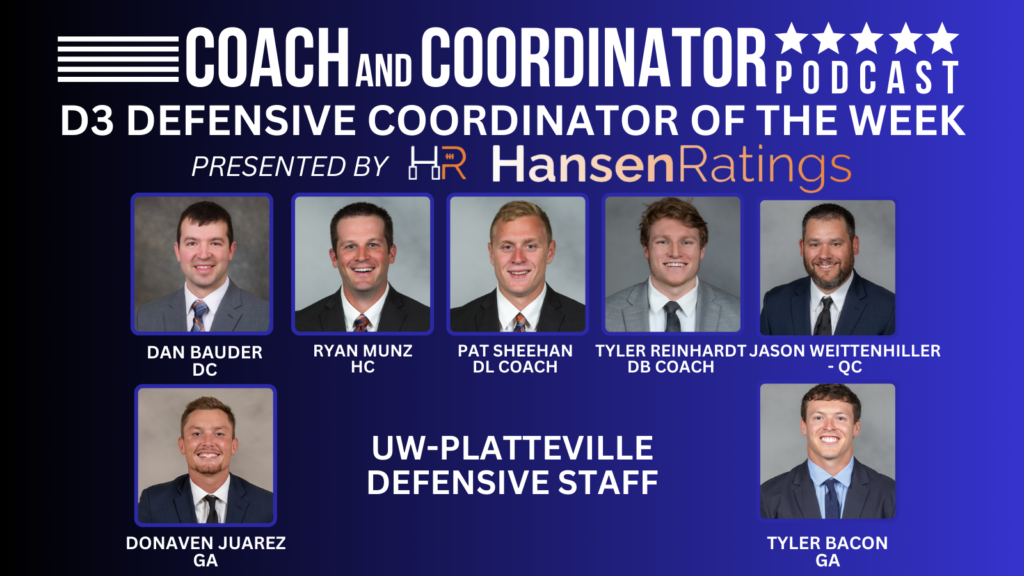
Dan Bauder, the Defensive Coordinator for the University of Wisconsin-Platteville, took a page out of the offensive playbook and incorporated a one-word call system into his defensive playbook. This approach, rooted in his journey through various traditional systems, reflects his belief in simplifying communication to maximize players’ speed and understanding on the field.
The Journey to One-Word Calls
Bauder’s early experiences at Wartburg College and Wittenberg University exposed him to conventional defensive call systems, where signals conveyed multiple parts of a total defensive call. It’s the typical format that everyone uses.
Upon assuming the Defensive Coordinator role at Augustana College, Bauder followed this traditional multi-word system, with signals detailing fronts, stunts, blitzes, and coverages. This sometimes left players overwhelmed, trying to decipher a string of instructions mid-game. When he arrived at Platteville, a meeting with then-Wisconsin Defensive Coordinator Jim Leonhard provided a breakthrough. Leonhard shared his method of one-word calls, which transformed Bauder’s outlook on defensive communication. “I thought it was absolutely crazy,” Bauder recalls. “But it was more about getting the information to the kids and having them put it in buckets.”
This encounter inspired Bauder to shift to a single-word call approach, where a solitary word carries all the details to to inform each defensive level—alignments, assignments, and responsibilities—while significantly reducing the mental load on players.
Benefits of the One-Word Call System
- Speed and Simplicity: With one-word calls, Bauder’s players receive and process information faster, allowing them to get set quickly, focus on their keys, and initiate plays without hesitation. “Your kids play a lot faster when they stop thinking,” he explains. “The faster that your kids can play with the less amount of thinking, the better results you’re going to see.”
- Improved Focus: With simplified calls, Bauder’s players no longer need to interpret a series of signals and calls, freeing them to concentrate on the game’s flow and their roles. Players in each position group know which “bucket” their responsibilities fall into, creating a framework where a single word becomes an intuitive prompt for complex actions. Bauder describes the reaction from his players when he uses two words for a play: “The running joke now is that, if we ever have something that is two words, the kids are like, ‘Oh, hey, Coach, are you sure you want to do that?’”
- Reduced Vulnerability to Signal Stealing: One-word calls also mitigate the risk of opponents deciphering defensive plays. While offensive units often deploy complex signal-calling methods with multiple decoys, Bauder’s streamlined one-word calls minimize predictability, enhancing game security against potential interceptions of defensive signals. “Defensive coordinators often want to handle signals alone, but that’s where one-word calls add another layer of protection,” Bauder says, adding that having fewer complex signals makes it harder for opposing teams to pick up patterns.
Methodology of One-Word Calls
Bauder’s approach emphasizes word association and categorization to maintain clarity and consistency. For instance, color-coded words can denote man-to-man coverages, with each color signaling specific alignments for the front line, linebackers, and secondary. This structure allows players to quickly associate calls with pre-defined schemes and formations. Defensive players interpret these words based on their group’s unique role, creating a common language across the defense.
By building associations with each call, players categorize actions into familiar patterns or “buckets,” which are further refined by training. This process enables Bauder to be “multiple” in his defensive play-calling, presenting a varied look to opponents while maintaining simplicity for his players.
The Impact
The transition to one-word calls at Wisconsin-Platteville has enhanced Bauder’s defense by promoting a faster, more adaptable unit that can play instinctively. As Bauder himself puts it, “It helps our kids play fast. And again, like we talked about earlier, the faster that your kids can play with the less amount of thinking, I think you’re going to see better results typically.” His approach demonstrates that sometimes, less is indeed more in the complex world of defensive football strategy.
D3 Defensive Coordinator of the Week
Dan Bauder was named the Coach and Coordinator D3 Defensive Coordinator of the Week for the Pioneers’ win over UW-Whitewater. Ryan Munza is the head coach at Platteville and the defensive assistants are Pat Sheehan, Tyler Reinhardt, Jason Weittenhiller, Donoven Juarez, and Tyler Bacon.
Notable Stats
Dan Bauder | UW-Platteville | 17-10 vs. UW-Whitewater
- Highest graded & highest rated defense all season
- Held Warhawks scoreless second half
- Completion percentage allowed <50%
- 3 of 13 on 3rd downs & 1 of 3 on 4th
- Forced the only turnover of the game in 4th to setup FG



